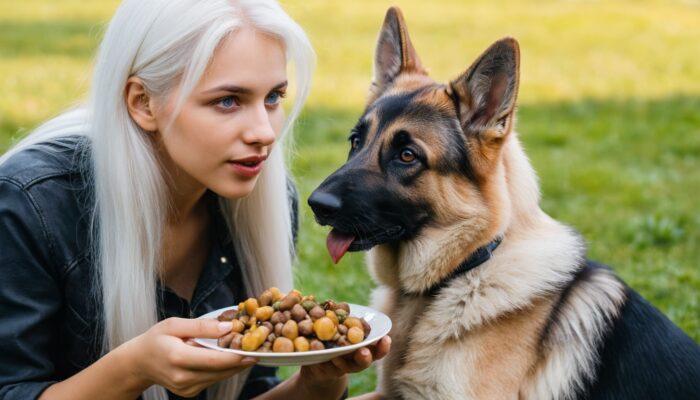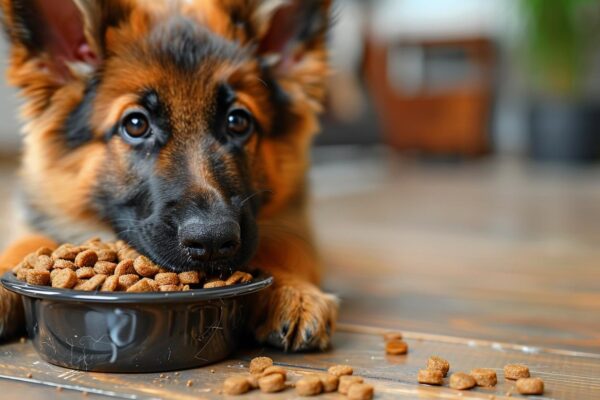How Much Should I Feed My German Shepherd Puppy
How Much Should I Feed My German Shepherd Puppy
How Much Should I Feed My German Shepherd Puppy? A Complete Guide to Ensuring Proper Nutrition for Your Growing Pup
Feeding your German Shepherd puppy the right amount of food is crucial for their growth, development, and overall health. As a proud owner, it’s important to understand how much food your puppy needs, what type of food is best, and how to adjust their diet as they grow. This article will provide you with a detailed guide on how much to feed your German Shepherd puppy, ensuring they thrive in their early stages of life.
Understanding Your German Shepherd Puppy’s Nutritional Needs
German Shepherd puppies are known for their energy and intelligence. They grow quickly, so it’s vital to provide the right nutrition to support their development. The right amount of food depends on various factors, including age, weight, and activity level.
Puppy Growth Stages
- Birth to 8 Weeks: During this period, puppies should ideally stay with their mother and nurse.
- 8 to 12 Weeks: Puppies start eating solid food. This is when you introduce puppy food.
- 3 to 6 Months: Rapid growth occurs. They need higher-calorie food.
- 6 to 12 Months: Growth slows down, but they still need a balanced diet.
How Much Should I Feed My German Shepherd Puppy a Day?

To determine how much food to give your German Shepherd puppy each day, consider their age and weight. Here’s a simple table that outlines daily feeding amounts based on age and weight:
| Age (Months) | Weight (Pounds) | Daily Food Amount (Cups) |
|---|---|---|
| 2 | 10 | 2-2.5 |
| 3 | 15 | 2.5-3 |
| 4 | 25 | 3-3.5 |
| 5 | 30 | 3.5-4 |
| 6 | 35 | 4-4.5 |
| 7 | 40 | 4.5-5 |
| 8 | 45 | 5-5.5 |
| 9 | 50 | 5.5-6 |
| 10 | 55 | 6-6.5 |
| 11 | 60 | 6.5-7 |
| 12 | 65 | 7-7.5 |
This table provides a rough guideline. Always check the specific recommendations on your puppy food packaging, as different brands may have varying calorie counts.
How Often Should I Feed My German Shepherd Puppy?
Feeding frequency is just as important as the amount. Here’s a general guideline for feeding schedules:
- 2 to 3 Months: 4 meals a day
- 3 to 6 Months: 3 meals a day
- 6 to 12 Months: 2 meals a day
Tips for Feeding Frequency
- Consistency: Stick to a schedule to help your puppy develop a routine.
- Adjust as Needed: If your puppy seems hungry or gains too much weight, consider adjusting meal sizes or frequency.
- Avoid Free-Feeding: Don’t leave food out all day, as this can lead to overeating.
How Much Dog Food Should I Feed My German Shepherd Puppy?

When selecting dog food, look for high-quality brands specifically formulated for puppies. These foods contain the right balance of nutrients for growth.
Measuring Dog Food
- Dry Food: Measure using cups. Follow the guidelines provided by the food brand.
- Wet Food: If feeding wet food, check the packaging for feeding recommendations. Generally, combine wet and dry food for a balanced diet.
Choosing the Right Food
Look for puppy formulas that include:
- High protein content (chicken, lamb, etc.)
- Healthy fats (fish oil, chicken fat)
- Essential vitamins and minerals (calcium, phosphorus)
How Much Wet Food Should I Feed My German Shepherd Puppy?

Wet food can be a tasty addition to your puppy’s diet. If you choose to include it, you can use the following guidelines:
- Age (Months): 2 to 3 months
- Daily Amount: 1/2 to 1 can
- Age (Months): 3 to 6 months
- Daily Amount: 1 to 1.5 cans
- Age (Months): 6 to 12 months
- Daily Amount: 1.5 to 2 cans
Mixing Wet and Dry Food
For a balanced diet, consider mixing wet and dry food. This combination can enhance flavor and moisture, making it more appealing to your puppy.
How Many Times Should I Feed My German Shepherd Puppy?

The number of meals your puppy receives daily is crucial. Here’s a quick reminder of the feeding schedule:
- 2 to 3 Months: 4 meals per day
- 3 to 6 Months: 3 meals per day
- 6 to 12 Months: 2 meals per day
Transitioning to Fewer Meals
As your puppy grows, you can gradually reduce the number of meals:
- Start by decreasing from 4 to 3 meals around 3 months.
- Transition to 2 meals around 6 months.
How Much Water Should I Give My German Shepherd Puppy?
Proper hydration is essential for your puppy’s health. Puppies typically need about 1 ounce of water per pound of body weight each day.
Water Guidelines
- Monitor Water Intake: Always provide fresh water. Puppies are playful and may need more hydration after playtime.
- Check for Cleanliness: Change water daily to keep it clean and fresh.
Signs of Overfeeding or Underfeeding
It’s important to monitor your puppy’s weight and overall health. Here are signs to watch for:
Overfeeding Signs
- Excessive weight gain
- Difficulty in movement
- Vomiting or diarrhea
Underfeeding Signs
- Weight loss or failure to gain weight
- Lack of energy
- Dull coat
If you notice any of these signs, consult your veterinarian for guidance.
Additional Tips for Feeding Your German Shepherd Puppy
- Use Quality Bowls: Stainless steel or ceramic bowls are best as they are easy to clean and durable.
- Create a Calm Environment: Feed your puppy in a quiet area to minimize distractions during mealtime.
- Monitor Treats: Treats should not exceed 10% of your puppy’s daily caloric intake. Choose healthy options to avoid unnecessary weight gain.
- Consult a Veterinarian: Regular check-ups will help ensure your puppy is growing properly. Your vet can provide personalized feeding recommendations based on your puppy’s health.
How Much Should I Feed My 3-Month-Old German Shepherd Puppy?

At three months old, your German Shepherd puppy is still in a critical growth phase. Typically, a puppy of this age needs about 3 to 4 cups of high-quality puppy food per day. It’s best to divide this amount into three meals to help with digestion and maintain energy levels throughout the day.
Daily Feeding Breakdown:
- Morning: 1 cup
- Afternoon: 1 cup
- Evening: 1 cup
As your puppy grows, you can adjust the food quantity, but keep an eye on their weight and activity level.
How Much Should I Feed My 12-Week-Old German Shepherd Puppy?
By the time your puppy reaches 12 weeks, they may still be eating similar amounts as at three months. However, you might notice a slight increase in appetite as they continue to grow. Generally, they should still receive around 3 to 4 cups of puppy food per day, split into three meals.
German Shepherd Feeding Chart by Age
To make feeding easier, here’s a simple feeding chart based on age:
| Age | Daily Food Amount | Meals Per Day |
|---|---|---|
| 8 weeks | 2 to 3 cups | 4 |
| 3 months | 3 to 4 cups | 3 |
| 6 months | 4 to 5 cups | 2 or 3 |
| 1 year | 5 to 6 cups | 2 |
How Much Should a German Shepherd Eat a Day?
In general, adult German Shepherds require about 2 to 3% of their body weight in food daily. This percentage can vary based on their activity level, metabolism, and overall health. For a puppy, it’s best to follow the feeding recommendations specific to their age and size, as noted in the chart.
How Much Should I Feed My German Shepherd Puppy Per Meal?
When feeding your puppy, consider how much they weigh. For example, a 20 kg (44 lbs) German Shepherd puppy may need about 3 to 4 cups of food per day, split into meals. This would mean around 1 to 1.5 cups per meal if you’re feeding them three times a day.
How Much Should a German Shepherd Eat a Day in Kg?
If you prefer measuring food in kilograms, here’s a simple conversion:
- For a 10 kg puppy, aim for about 200 to 300 grams of food per day.
- For a 20 kg puppy, aim for around 300 to 400 grams daily.
Always adjust based on your puppy’s activity level and growth.
How Much to Feed a German Shepherd Puppy by Weight
The feeding amount also depends on the weight of your puppy. Here’s a quick reference:
- Puppy weighs 5 kg: 100 to 150 grams of food daily.
- Puppy weighs 10 kg: 200 to 300 grams of food daily.
- Puppy weighs 15 kg: 300 to 400 grams of food daily.
- Puppy weighs 20 kg: 400 to 500 grams of food daily.
How Much to Feed a German Shepherd Puppy at 8 Weeks
At 8 weeks, your German Shepherd puppy should eat about 2 to 3 cups of puppy food daily, divided into four meals. This helps them transition from their mother’s milk to solid food gradually.
Creating a Feeding Schedule
Developing a consistent feeding schedule is crucial. Puppies thrive on routine, which can also help with potty training. Here’s a suggested schedule:
- Morning: 7 AM
- Midday: 12 PM
- Afternoon: 5 PM
- Evening: 9 PM
Choosing the Right Food
Not all dog foods are created equal. Here are some tips for selecting the best food for your German Shepherd puppy:
- Look for Quality Ingredients: The first ingredient should be a high-quality protein source (like chicken, beef, or lamb).
- Check for AAFCO Approval: Ensure the food meets the standards set by the Association of American Feed Control Officials.
- Avoid Fillers: Stay away from foods that list corn, soy, or wheat as the main ingredients.
Transitioning to Adult Food
As your puppy approaches one year, you’ll want to start transitioning to adult food. This usually happens around 12 months. Gradually mix adult food with puppy food over a week to avoid digestive upset.
Monitoring Weight and Adjusting Food Amounts
Regularly check your puppy’s weight and body condition. If they are gaining too much weight, reduce their food slightly. Conversely, if they seem too thin or hungry, increase their portions. Consult your veterinarian for personalized advice if you’re unsure.
Understanding Puppy Behavior and Appetite
Puppies can be enthusiastic eaters, but watch for signs of overeating or picky behavior. If your puppy consistently leaves food behind, you may need to adjust portion sizes or change food types. Always consult with a vet if you notice significant changes in eating habits.
The Importance of Fresh Water
Always provide fresh, clean water. Hydration is essential, especially if your puppy is active. Make sure their water bowl is filled and cleaned regularly.
Special Considerations for German Shepherds
German Shepherds are prone to certain health issues, including hip dysplasia and obesity. Feeding a well-balanced diet and maintaining a healthy weight is crucial. Always keep an eye on your puppy’s joints and activity level.
AKC German Shepherd Feeding Chart
The American Kennel Club (AKC) provides guidelines on how much to feed your German Shepherd puppy based on their weight and age. Here’s a basic feeding chart to help you:
| Age | Weight (lbs) | Cups of Food per Day |
|---|---|---|
| 8 weeks | 10-15 | 2-3 |
| 3 months | 20-30 | 3-4 |
| 6 months | 30-50 | 4-5 |
| 9 months | 50-70 | 4-6 |
| 12 months | 70+ | 3-5 |
This chart is a general guideline. Always consult with your veterinarian to determine the best feeding plan for your specific puppy.
German Shepherd Feeding Chart by Weight
The amount you feed your puppy also depends on their weight. Here’s a more detailed breakdown:
- Under 10 lbs: 1/2 to 1 cup per day.
- 10-20 lbs: 1 to 1.5 cups per day.
- 20-40 lbs: 1.5 to 2.5 cups per day.
- 40-60 lbs: 2.5 to 3.5 cups per day.
- 60-80 lbs: 3.5 to 4.5 cups per day.
It’s important to measure the food accurately to avoid overfeeding, which can lead to obesity and health problems later on.
What is a Good Puppy Feeding Schedule?
Establishing a consistent feeding schedule is crucial for your German Shepherd puppy. Here’s a recommended schedule:
- 8-12 weeks old: Feed 4 times a day.
- 3-6 months old: Feed 3 times a day.
- 6-12 months old: Feed 2 times a day.
Tips for Feeding Schedule:
- Consistency: Try to feed your puppy at the same times every day. This helps them learn when to expect food.
- Monitor Portions: Stick to the guidelines and adjust based on your puppy’s appetite and growth.
- Post-Meal Walks: Allow some time for digestion before taking your puppy for a walk after meals.
How Often Should I Bathe My German Shepherd Puppy?
Bathing is another important aspect of caring for your puppy. German Shepherds have a double coat, which can trap dirt and odors. Here are some guidelines:
- Frequency: You can bathe your German Shepherd puppy every 1-2 months. Too frequent bathing can strip their coat of natural oils.
- Cleaning: Regular brushing (at least once a week) will help keep their coat clean and reduce the need for frequent baths.
Can I Bathe My 2 Month Old German Shepherd Puppy?
Yes, you can bathe a 2-month-old German Shepherd puppy. Use a gentle puppy shampoo and make sure the water is warm but not hot. After the bath, dry them thoroughly to prevent them from getting cold.
What Foods Can German Shepherds Not Eat?
It’s crucial to know what foods are harmful to your puppy. Some foods to avoid include:
- Chocolate: Highly toxic and can cause serious health issues.
- Grapes and Raisins: Can lead to kidney failure.
- Onions and Garlic: Can damage red blood cells and lead to anemia.
- Alcohol: Extremely dangerous and can cause poisoning.
- Avocado: Contains a substance called persin, which can be harmful.
Always check labels and consult with your vet if you’re unsure about a food item.
When to Switch GSD to Adult Food?
Typically, you can transition your German Shepherd from puppy food to adult food around 12 months of age. However, large breeds like German Shepherds may benefit from staying on puppy food a little longer to ensure proper growth. Here are some signs it might be time to switch:
- Growth Plate Closure: Consult your vet to know when your puppy’s growth plates close.
- Weight Maintenance: If your puppy is gaining weight too quickly, it might be time to consider adult food.
How to Transition to Adult Food
When making the switch, do it gradually over a week or two. Start by mixing a small amount of adult food with their puppy food, gradually increasing the proportion of adult food.
How Do I Know If I’m Feeding My Puppy Enough?
It can be challenging to know if you’re feeding your puppy the right amount. Here are some signs to look for:
- Weight: Monitor your puppy’s weight regularly. If they are gaining too much weight or not enough, adjust their food accordingly.
- Body Condition Score (BCS): You should be able to feel your puppy’s ribs without excess fat covering. They should have a defined waist when viewed from above.
- Energy Levels: A well-fed puppy should have lots of energy and be active without being hyper.
- Stool Quality: Healthy stool should be firm and well-formed. Diarrhea or very soft stools can indicate dietary issues.
Can You Overfeed a German Shepherd Puppy?
Yes, you can overfeed your German Shepherd puppy. Overfeeding can lead to obesity, which can cause health problems later in life. Signs that you might be overfeeding include:
- Excess weight gain
- Difficulty in exercising
- Decreased energy levels
To prevent overfeeding, measure your puppy’s food and stick to a regular feeding schedule. Consult your veterinarian if you’re unsure about the right amount of food.
How to Fatten Up a German Shepherd
If your German Shepherd puppy is underweight, there are safe ways to help them gain weight. Here are some tips:
- Choose High-Quality Puppy Food: Look for a brand that lists meat as the first ingredient and is high in protein and fat.
- Increase Meal Portions Gradually: Don’t drastically increase their food all at once. Gradually add more food over a week to avoid digestive issues.
- Add Supplements: You might consider adding supplements like fish oil for extra calories and healthy fats.
- Frequent Feeding: Offer smaller meals more frequently throughout the day to increase calorie intake.
- Consult Your Vet: Always consult your veterinarian before making any significant changes to your puppy’s diet.
At What Age is a German Shepherd Fully Grown?
German Shepherds typically reach their full size by 18 to 24 months. However, they may continue to fill out and develop muscle mass until around 3 years old. Factors that affect growth include genetics, diet, and exercise.
How Do I Know if My German Shepherd Puppy is Going to Be Big?
You can get an idea of how big your German Shepherd puppy will be by:
- Checking Their Paws: Larger paws can indicate that your puppy will grow into a larger dog.
- Looking at Parent Size: If you know the sizes of the puppy’s parents, this can be a good indicator.
- Growth Rate: Keep track of your puppy’s growth over the first year. A healthy growth rate usually means they will grow into a healthy adult size.
What Age Do German Shepherds Slow Down?

German Shepherds typically start to slow down around 6 to 8 years of age. However, many remain active and playful into their senior years with proper care and diet. Regular exercise and a balanced diet can help maintain their energy levels as they age.
What is the Feeding Schedule for Puppies?
A feeding schedule is crucial for your puppy’s development. Here’s a basic guide:
- 8-12 Weeks: Feed three to four meals a day.
- 3-6 Months: Feed three meals a day.
- 6-12 Months: Transition to two meals a day.
Consistency is key. Make sure to feed your puppy at the same times each day. This helps with digestion and can make potty training easier.
How Much Chicken and Rice Should I Feed My German Shepherd?
Chicken and rice are often recommended for dogs with upset stomachs. If you’re preparing a meal of chicken and rice for your puppy, a general guideline is:
- 1 part cooked chicken (boneless, skinless)
- 2 parts cooked rice
For a 20-pound puppy, you might start with 1 cup of the chicken and rice mixture. Monitor their reaction and adjust as necessary. Always consult your vet before changing your puppy’s diet, especially for an extended period.
What is the Best Diet for a German Shepherd?
Nutritional Needs
German Shepherds are large, active dogs that require a balanced diet. A good diet for your puppy should include:
- High-Quality Protein: Look for dog foods that list meat as the first ingredient. Protein is vital for muscle development.
- Healthy Fats: Fats provide energy and support skin and coat health. Omega-3 and Omega-6 fatty acids are beneficial.
- Carbohydrates: Whole grains and vegetables can provide energy and aid digestion.
- Vitamins and Minerals: Essential for growth, a good puppy food will include all the necessary vitamins and minerals.
Types of Dog Food
There are several types of dog food available:
- Dry Kibble: This is convenient and helps keep your puppy’s teeth clean.
- Wet Food: This can be more palatable for picky eaters but often costs more.
- Raw Diet: Some owners opt for a raw diet, but it’s essential to do thorough research to ensure it’s balanced.
- Homemade Food: You can prepare food at home, but it’s crucial to consult with a veterinarian to ensure it meets all nutritional needs.
How Many Cups of Food Should I Feed My Puppy?
Portion Sizes
The amount of food your puppy needs will depend on their age, weight, and activity level. Here’s a general guideline:
- 8 to 12 Weeks Old: 2 to 3 cups of puppy food per day, divided into 3 meals.
- 3 to 6 Months Old: 3 to 4 cups per day, divided into 3 meals.
- 6 to 12 Months Old: 4 to 5 cups per day, divided into 2 meals.
Always consult the feeding guidelines on the dog food packaging, as different brands may have different recommendations.
Monitoring Weight
Keep an eye on your puppy’s weight. If they are gaining too much weight, consider reducing the food slightly. If they are too thin, you might need to increase their portions. Regular vet check-ups can help monitor their growth and health.
What Time Should Puppies Go to Bed?
Establishing a Routine
A consistent bedtime is crucial for your puppy’s development. Puppies need about 18-20 hours of sleep daily. Aim for a bedtime that allows them to have a quiet and comfortable place to sleep.
- Ideal Bedtime: Most puppies do well with a bedtime between 8 PM and 10 PM.
- Routine: Create a routine that includes feeding, playtime, and bathroom breaks before bed. This helps your puppy settle down for the night.
How Long After Eating Does a Puppy Poop?
Digestion Timeline
Puppies generally need to go to the bathroom shortly after eating. Here’s a general timeline:
- Within 15-30 Minutes: Most puppies will need to relieve themselves within this timeframe after eating.
- Factors Influencing This: The time can vary based on the puppy’s age, diet, and individual metabolism.
To help your puppy develop good habits, take them outside shortly after meals. This will also help with potty training.
How Many Cups of Dry Food Should I Feed My German Shepherd?
Specific Feeding Guidelines
For a German Shepherd puppy, the amount of dry food can depend on their age and weight. Here’s a breakdown:
- 8 to 12 Weeks Old: 2 to 3 cups per day, divided into 3 meals.
- 3 to 6 Months Old: 3 to 4 cups per day, divided into 3 meals.
- 6 to 12 Months Old: 4 to 5 cups per day, divided into 2 meals.
Choosing the Right Food
Ensure you choose a high-quality dry puppy food that meets the AAFCO (Association of American Feed Control Officials) standards for growth. This ensures that the food provides complete and balanced nutrition.
What Homemade Food Can German Shepherds Eat?
Preparing Homemade Meals
If you prefer to prepare homemade meals for your German Shepherd, it’s essential to include the right ingredients. Here are some foods you can safely include:
- Lean Meats: Chicken, turkey, and beef are excellent protein sources.
- Vegetables: Carrots, peas, and spinach are good options.
- Grains: Brown rice and oatmeal can provide energy.
- Fruits: Apples (without seeds), blueberries, and bananas can be healthy treats.
Important Considerations
- Consult Your Vet: Before starting a homemade diet, talk to your veterinarian to ensure it’s balanced and meets all nutritional needs.
- Avoid Toxic Foods: Certain foods are toxic to dogs, including chocolate, grapes, onions, and garlic. Always do your research before introducing new foods.
Feeding Schedule
Establishing a Routine
Creating a consistent feeding schedule is essential for your puppy’s routine. Here’s a suggested feeding schedule:
- 8 to 12 Weeks Old: Feed 3 meals per day.
- 3 to 6 Months Old: Continue with 3 meals per day.
- 6 to 12 Months Old: Transition to 2 meals per day.
Tips for Feeding
- Consistency: Feed your puppy at the same times each day to establish a routine.
- Portion Control: Measure the food to prevent overfeeding.
- Avoid Human Food: Stick to dog food and treats. Human food can lead to obesity and health issues.
Types of Food: Commercial vs. Homemade
Can I Feed My Dog Homemade Food Every Day?
Yes, you can feed your German Shepherd puppy homemade food every day, but you need to ensure it is well-balanced. If you choose to prepare homemade meals, consider these points:
- Balanced Diet: Your homemade meals should include a mix of proteins (chicken, beef, fish), carbohydrates (rice, sweet potatoes), vegetables (carrots, peas), and healthy fats (fish oil, flaxseed oil).
- Consult a Veterinarian: Before making any major changes to your puppy’s diet, it’s best to consult with a veterinarian or a pet nutritionist. They can help you create a balanced meal plan.
- Avoid Harmful Foods: Certain foods like chocolate, grapes, onions, and garlic are toxic to dogs and should always be avoided.
- Vitamins and Supplements: Homemade diets may lack essential vitamins and minerals. You might need to add supplements to ensure your puppy gets everything they need for healthy growth.
Commercial Puppy Food Options
When selecting commercial puppy food, look for high-quality brands that meet the Association of American Feed Control Officials (AAFCO) standards. Here are a few options:
- Dry Kibble: This is convenient and helps maintain dental health. Look for brands specifically formulated for large-breed puppies.
- Wet Food: This can be mixed with dry food for added moisture and flavor. Ensure it’s high in protein and low in fillers.
- Raw Diet: Some owners choose to feed a raw diet, which consists of uncooked meat, bones, and vegetables. If you go this route, be sure to research extensively and consult a vet.
Growth Stages of a German Shepherd Puppy
At What Age Do German Shepherds Fill Out?
German Shepherds typically fill out between 2 to 3 years of age. However, their growth rate can vary:
- 8 weeks to 6 months: Rapid growth occurs, and puppies can gain several pounds per week.
- 6 months to 1 year: Growth slows down, but they continue to gain muscle and height.
- 1 to 2 years: They will reach their full height and start to fill out.
What Age Should I Wean My German Shepherd Puppy?
Weaning usually occurs around 6 to 8 weeks of age. By this time, puppies should be transitioning from their mother’s milk to solid food. It’s essential to introduce puppy food gradually during this period.
- Start Early: Introduce soft puppy food mixed with water or puppy formula around 3-4 weeks.
- Gradual Transition: Slowly increase the amount of solid food while decreasing milk.
- Monitor Progress: Ensure all puppies in the litter are gaining weight and adapting well to the change.
How Long Is a Dog Considered a Puppy?
A dog is generally considered a puppy until they reach about 1 year of age. However, large breeds like German Shepherds may take a bit longer to mature. Here’s a quick breakdown:
- Puppy Stage: Birth to 1 year.
- Adolescent Stage: 1 to 2 years, where they may exhibit challenging behaviors as they mature.
- Adult Stage: By age 2, most German Shepherds are considered adults.
FAQs
Conclusion
Feeding your German Shepherd puppy correctly is vital for their growth and development. By understanding how much to feed, how often, and what types of food to provide, you’ll set your puppy up for a healthy life. Remember to monitor their weight and consult your veterinarian if you have any concerns. Enjoy this exciting time with your furry friend, and watch them grow strong and healthy!

